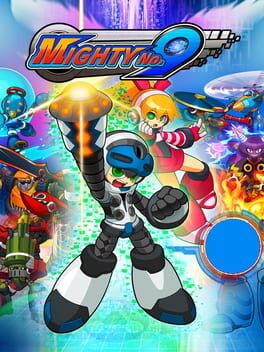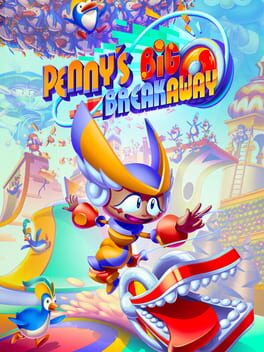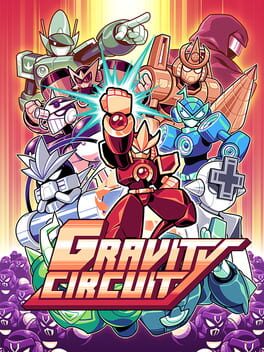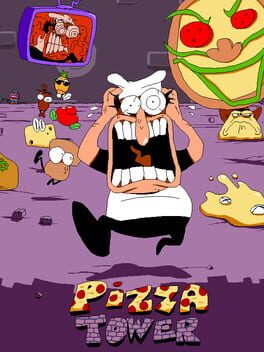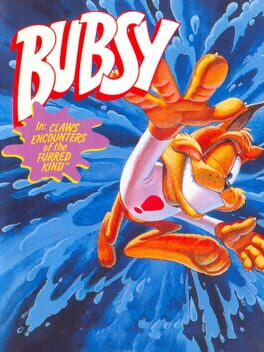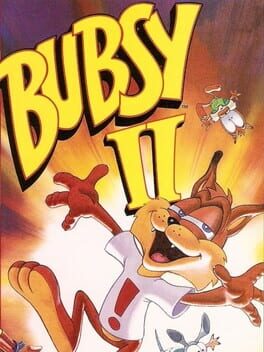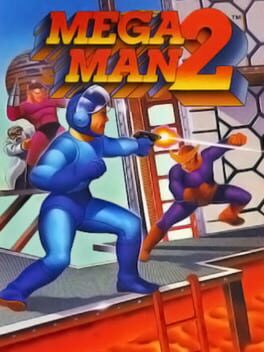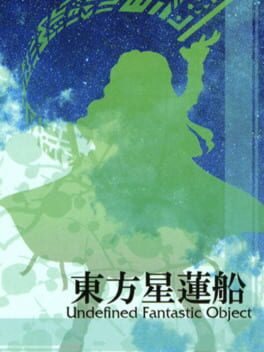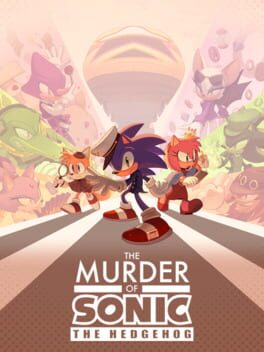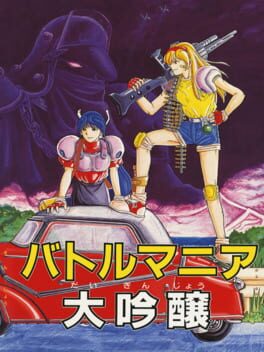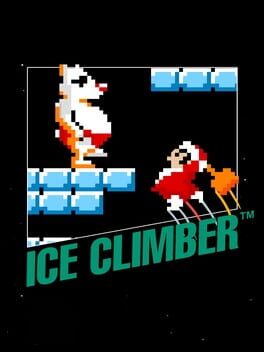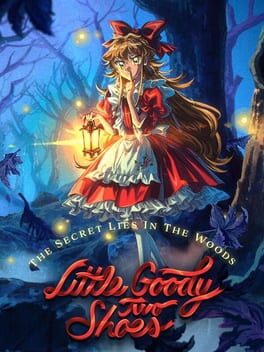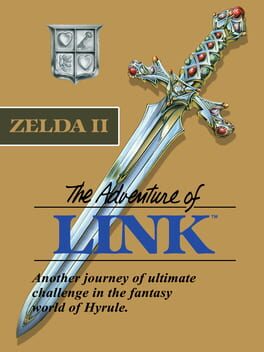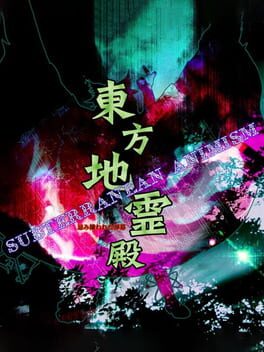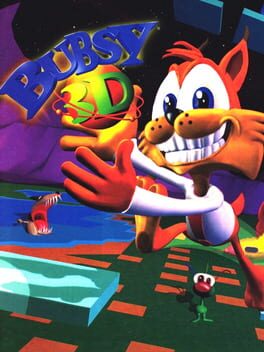UnluckyLucky
2016
If I wanted to take the easy way out, I could leave a one sentence review dunking on this game. "Every Mega Man fan's worst nightmare," right? But this game isn't that.
Say all you what about what this game was supposed to be; I hate Keiji Inafune just as much as you do. But through all the bad advertising, broken promises and baffling release cycle, Mighty No. 9 is still has good-- hell, even great, in the game itself.
That great is Beck himself. Despite it all, this game actually plays unimaginably well. His movement is excellent, and the core game design behind shooting enemies just enough to absorb them, then doing that quickly to keep up the momentum is a truly good evolution of Mega Man X (not Classic, though) gameplay. I'd say it's better than those games at this aspect, even. Beck's the most fun blue robot to play as, get over it.
Unfortunately for Mighty No. 9, making the character feel good to play as is not really a large part of these games. Jump N' Shoot Man has always typically been about the jumping and shooting; i.e, the level design.
This game's level design is game ruining.
It's just so... basic. So boring. It's like the developers didn't understand what a fun base they created and failed to utilize it effectively. While Beck plays like a Mega Man X character, the level design seems to want to be like Classic, and that creates such a big rift between how the levels are designed how the game encourages you to play through them. And regardless of that fatal disconnect, these stages aren't really good in a vacuum either. They're genuinely almost all nothing-- way too many of them are literally straight lines to boring ass enemy rooms, then a continued straight line to the end. It's so... goddamn... boring.
The bosses don't fare much better either. Again, almost all of them are boring. Usually Mega Man bosses make you interact with their attacks and movement in interesting ways, but this game doesn't do that either. You get in their faces, you mash, they die. It's not everything in the game, but it's damn close. It's unbelievable to me that people complain about Trinity so much she at least requires constant interaction from you and forces you to use actively use the base mechanics. It's a glimpse of what this game should've been.
Enough about the gameplay though-- everyone knows the deal with the presentation in this game. Popcorn explosions and all that. However, this game's graphics are like, fine? They're certainly not the biggest issue with the overall feel of this game. That would be the story. While you can ignore it, it makes this game feel childish in a way Mega Man games usually don't. "Is this game for babies? Did they know who their audience was?" came up more than once when I was playing through MN9. The music in this game is also rather mediocre. It's one of Matsumae's worst works, which is sad. She's typically a pretty good composer.
At the end of the day, Mighty No. 9 is a tragedy. Through it's development for one, but through the game itself for another. They had it all-- and it was all sqaundered because this game just has bad levels. Maybe someone will make a spiritual successor to Mighty No. 9 someday.
Not you, IntiCreates. It's over, bro. Let it go.
Say all you what about what this game was supposed to be; I hate Keiji Inafune just as much as you do. But through all the bad advertising, broken promises and baffling release cycle, Mighty No. 9 is still has good-- hell, even great, in the game itself.
That great is Beck himself. Despite it all, this game actually plays unimaginably well. His movement is excellent, and the core game design behind shooting enemies just enough to absorb them, then doing that quickly to keep up the momentum is a truly good evolution of Mega Man X (not Classic, though) gameplay. I'd say it's better than those games at this aspect, even. Beck's the most fun blue robot to play as, get over it.
Unfortunately for Mighty No. 9, making the character feel good to play as is not really a large part of these games. Jump N' Shoot Man has always typically been about the jumping and shooting; i.e, the level design.
This game's level design is game ruining.
It's just so... basic. So boring. It's like the developers didn't understand what a fun base they created and failed to utilize it effectively. While Beck plays like a Mega Man X character, the level design seems to want to be like Classic, and that creates such a big rift between how the levels are designed how the game encourages you to play through them. And regardless of that fatal disconnect, these stages aren't really good in a vacuum either. They're genuinely almost all nothing-- way too many of them are literally straight lines to boring ass enemy rooms, then a continued straight line to the end. It's so... goddamn... boring.
The bosses don't fare much better either. Again, almost all of them are boring. Usually Mega Man bosses make you interact with their attacks and movement in interesting ways, but this game doesn't do that either. You get in their faces, you mash, they die. It's not everything in the game, but it's damn close. It's unbelievable to me that people complain about Trinity so much she at least requires constant interaction from you and forces you to use actively use the base mechanics. It's a glimpse of what this game should've been.
Enough about the gameplay though-- everyone knows the deal with the presentation in this game. Popcorn explosions and all that. However, this game's graphics are like, fine? They're certainly not the biggest issue with the overall feel of this game. That would be the story. While you can ignore it, it makes this game feel childish in a way Mega Man games usually don't. "Is this game for babies? Did they know who their audience was?" came up more than once when I was playing through MN9. The music in this game is also rather mediocre. It's one of Matsumae's worst works, which is sad. She's typically a pretty good composer.
At the end of the day, Mighty No. 9 is a tragedy. Through it's development for one, but through the game itself for another. They had it all-- and it was all sqaundered because this game just has bad levels. Maybe someone will make a spiritual successor to Mighty No. 9 someday.
Not you, IntiCreates. It's over, bro. Let it go.
If Gravity Circuit is an example of a game "not understanding the inner workings of the many things it's inspired by", then Penny's Big Breakaway is the exact opposite. If anything, this game feels like something made by game designers first, and everything else second.
This is to say: Penny's moment to moment gameplay is really good. It's an incredibly smart game from start to finish. Penny herself is up there in the list of "best controlling platforming characters." There existing an actual learning curve to effectively using the Yoyo tricks to keep your flow is shows to me that Evening Star understands the secret sauce of other high skill ceiling platformers. The combo system and focus on score attack mechanics does wonders for this game's level design and dramatically increases the depth of sections I typically would not have a second thought about. "How do I get through this efficiently?", "Should I risk getting hit and dropping my multiplier here?", etc. There's tons of performers in Penny's (being the game's theme) and you, the player, are one too. The developers ask you to step into the spotlight: "can you show us that you've got it down?"
It's funny to hear the mixed reception of this game's controls in more critical spaces online, because all the people I've seen who stuck with it ended up appreciating how Penny's plays by the end.
Almost as if game design that pushes the player to get better can be rewarding, or something...
Now, I won't boil down all (only some) of the complaints about this game into a simple "skill issue"-- it's clearly more complicated than that. The bugs, for example, are not really a complaint that can be argued against. I think some exaggerate how often and intrusive the glitches really are, but there's definitely some jank in this game. It feels bad to lose your high combo due to a physics inconsistency. I also think Penny's suffers from "bad boss fight" disease-- strange for a game that seemingly understands platformers can be satisfying without them. It especially hurts to end the game on such a "blah" note of the final boss which captures exactly none of the aspects that make the levels so fun.
Out of all the complaints I'm the most sympathetic to, though, it has to be what I've seen about the presentation. Don't get me wrong-- it's not bad at all. There's some truly good tracks and area design in this game. Tee Lopes in particular pops off for the level themes in this game. I like that guy. But I don't know, man. If Penny's has the secret sauce in regards to its level design and moment to moment gameplay, I don't think it does in regards to its presentation. I wasn't ever really enraptured with the world of Macaroon like I was with the technically amazing game design. I still like Penny (the girlie) though. She's cool, even if she does have grandma hair.
Still, Penny is a great game. It genuinely makes the shot for one of the best 3D platformers I have ever played, and if Evening Star can make something this impressive when left to their own devices I greatly anticipate whatever it is they make next. There's clearly some real talent here.
This is to say: Penny's moment to moment gameplay is really good. It's an incredibly smart game from start to finish. Penny herself is up there in the list of "best controlling platforming characters." There existing an actual learning curve to effectively using the Yoyo tricks to keep your flow is shows to me that Evening Star understands the secret sauce of other high skill ceiling platformers. The combo system and focus on score attack mechanics does wonders for this game's level design and dramatically increases the depth of sections I typically would not have a second thought about. "How do I get through this efficiently?", "Should I risk getting hit and dropping my multiplier here?", etc. There's tons of performers in Penny's (being the game's theme) and you, the player, are one too. The developers ask you to step into the spotlight: "can you show us that you've got it down?"
It's funny to hear the mixed reception of this game's controls in more critical spaces online, because all the people I've seen who stuck with it ended up appreciating how Penny's plays by the end.
Almost as if game design that pushes the player to get better can be rewarding, or something...
Now, I won't boil down all (only some) of the complaints about this game into a simple "skill issue"-- it's clearly more complicated than that. The bugs, for example, are not really a complaint that can be argued against. I think some exaggerate how often and intrusive the glitches really are, but there's definitely some jank in this game. It feels bad to lose your high combo due to a physics inconsistency. I also think Penny's suffers from "bad boss fight" disease-- strange for a game that seemingly understands platformers can be satisfying without them. It especially hurts to end the game on such a "blah" note of the final boss which captures exactly none of the aspects that make the levels so fun.
Out of all the complaints I'm the most sympathetic to, though, it has to be what I've seen about the presentation. Don't get me wrong-- it's not bad at all. There's some truly good tracks and area design in this game. Tee Lopes in particular pops off for the level themes in this game. I like that guy. But I don't know, man. If Penny's has the secret sauce in regards to its level design and moment to moment gameplay, I don't think it does in regards to its presentation. I wasn't ever really enraptured with the world of Macaroon like I was with the technically amazing game design. I still like Penny (the girlie) though. She's cool, even if she does have grandma hair.
Still, Penny is a great game. It genuinely makes the shot for one of the best 3D platformers I have ever played, and if Evening Star can make something this impressive when left to their own devices I greatly anticipate whatever it is they make next. There's clearly some real talent here.
2023
Huh? Retro throwbacks are based on games like Castlevania and Ninja Gaiden, right? Mega Man Zero is still pretty new...
Gravity Circuit is a premiere example of creators not truly understanding the inner workings of the many things they are inspired by. Not as vapid as many games that do this-- and ultimately still a solid (but far from great) game-- it manages to show a lot about platformers and the culture around "retro" games in a bite sized 2 - 3 hour package.
The reason why I even wanted to play this game in the first place was the cool grappling hook, and I am proud to say that it is Fun. Unlike a certain other Mega Man game, the swinging in this game feels great to do and moving across ceilings fluidly is some of the better movement I've been able to use in a high speed platformer like this. Grabbing and throwing enemies with this same hookshot is also real fun, and it might be the best feeling "chuck enemies at other enemies" game I've ever played. Things usually die from being smacked with one of their cohorts: so it becomes a satisfying process of killing each subsequent enemy with the other when you can, and using your superior movement to personally destroy vulnerable mooks. This is all really cool, but this game commits the sin that most platformers do: it doesn't evolve its ideas.
Despite what I just said about the grappling hook, most of Gravity Circuit's levels do not make you use it in ways that matter. It is a mechanic comprised entirely of intrinsic value, and sole mechanic that makes this game's movement unique should simply not be like that. Another issue with the level design is its emphasis on collectibles. The way these stages flow when you're playing properly it feels terrible to do that really obvious "hit the breakable wall and do a CHALLENGE..." type secret shit, and this game has a lot of that. It is confusing to me that Gravity Circuit decides to have in level collectibles for your health and super meter. Like no, dude, make it a reward for literally anything else. The other major gameplay problem are the Burst Mechanics: the super moves you get and the "stand in" for special weapons in a classic Mega Man game. These are lame. Despite sounding on paper like they open up various possibilities for how you deal with combat, they instead heavily centralize them. If you have meter you hit them with a big move and grab afterwards. Even bosses are not safe from this sort of design.
The Zero games are some of the most expressive platformers I've ever played. They have their own issues, sure, but a consistent strength of the series is how good it feels to perform under pressure. There's a lot of ways to move through levels efficiently and stylistically as Zero, and the series knows this. Much of the level design is intentionally made in ways that flow comes from smart game knowledge and tight execution. Mistakes are meaningful and even one misstep in the wrong place can destroy your flow at best and outright kill you at worst. Gravity Circuit is severely lacking in these aspects. Sure, there is sincere game knowledge required in using the grappling hook in effective ways: it isn't enough alone. The stakes are not high enough and the game is not freeform enough otherwise for me not to feel like I'm "going through the motions" even when I play well. Mixing up my gameplay is deemed irrelevant by the level design, and what does it matter if I get die? I go back to one of the 5 checkpoints per level and lose nothing from it. The Zero games put more on the player, and that's what makes them fun. The dance between player and designer is not as strong here, and as a MMZ inspired game I expect a little more from Gravity Circuit.
Overall, Gravity Circuit gets a lot wrong, especially in comparison to the MMZ games. The skill expression is significantly worse, the levels don't push the player and the "12-bit" presentation is unremarkable (because like hell am I doing a whole section on that shit). Despite it all though, it's a decent game. There is fun to be had playing it and it most definitely is an enjoyable high octane platformer in its own right. I hate to compare it to MMZ so much because they don't truly feel so similar when you get down to it, but in practice the Zero series embodies a lot of things: including a lot Gravity Circuit doesn't quite reach.
Gravity Circuit is a premiere example of creators not truly understanding the inner workings of the many things they are inspired by. Not as vapid as many games that do this-- and ultimately still a solid (but far from great) game-- it manages to show a lot about platformers and the culture around "retro" games in a bite sized 2 - 3 hour package.
The reason why I even wanted to play this game in the first place was the cool grappling hook, and I am proud to say that it is Fun. Unlike a certain other Mega Man game, the swinging in this game feels great to do and moving across ceilings fluidly is some of the better movement I've been able to use in a high speed platformer like this. Grabbing and throwing enemies with this same hookshot is also real fun, and it might be the best feeling "chuck enemies at other enemies" game I've ever played. Things usually die from being smacked with one of their cohorts: so it becomes a satisfying process of killing each subsequent enemy with the other when you can, and using your superior movement to personally destroy vulnerable mooks. This is all really cool, but this game commits the sin that most platformers do: it doesn't evolve its ideas.
Despite what I just said about the grappling hook, most of Gravity Circuit's levels do not make you use it in ways that matter. It is a mechanic comprised entirely of intrinsic value, and sole mechanic that makes this game's movement unique should simply not be like that. Another issue with the level design is its emphasis on collectibles. The way these stages flow when you're playing properly it feels terrible to do that really obvious "hit the breakable wall and do a CHALLENGE..." type secret shit, and this game has a lot of that. It is confusing to me that Gravity Circuit decides to have in level collectibles for your health and super meter. Like no, dude, make it a reward for literally anything else. The other major gameplay problem are the Burst Mechanics: the super moves you get and the "stand in" for special weapons in a classic Mega Man game. These are lame. Despite sounding on paper like they open up various possibilities for how you deal with combat, they instead heavily centralize them. If you have meter you hit them with a big move and grab afterwards. Even bosses are not safe from this sort of design.
The Zero games are some of the most expressive platformers I've ever played. They have their own issues, sure, but a consistent strength of the series is how good it feels to perform under pressure. There's a lot of ways to move through levels efficiently and stylistically as Zero, and the series knows this. Much of the level design is intentionally made in ways that flow comes from smart game knowledge and tight execution. Mistakes are meaningful and even one misstep in the wrong place can destroy your flow at best and outright kill you at worst. Gravity Circuit is severely lacking in these aspects. Sure, there is sincere game knowledge required in using the grappling hook in effective ways: it isn't enough alone. The stakes are not high enough and the game is not freeform enough otherwise for me not to feel like I'm "going through the motions" even when I play well. Mixing up my gameplay is deemed irrelevant by the level design, and what does it matter if I get die? I go back to one of the 5 checkpoints per level and lose nothing from it. The Zero games put more on the player, and that's what makes them fun. The dance between player and designer is not as strong here, and as a MMZ inspired game I expect a little more from Gravity Circuit.
Overall, Gravity Circuit gets a lot wrong, especially in comparison to the MMZ games. The skill expression is significantly worse, the levels don't push the player and the "12-bit" presentation is unremarkable (because like hell am I doing a whole section on that shit). Despite it all though, it's a decent game. There is fun to be had playing it and it most definitely is an enjoyable high octane platformer in its own right. I hate to compare it to MMZ so much because they don't truly feel so similar when you get down to it, but in practice the Zero series embodies a lot of things: including a lot Gravity Circuit doesn't quite reach.
2023
I can't fucking believe that there are contrarians out there that say this game is decent. It isn't.
While I don't dislike Bubsy as a character on principle, this game does him absolutely no favors. It is consistently unfair as hell-- for a multitude of reasons. First, Bubsy accelerates at the pace of a snail, but once he gets going he puts on Luigi's Trademarked Butter Shoes and is damn near impossible to stop. This is already an issue on its own, but in Bubsy 1 you die in one hit and you absolutely will run into things you can't see if you don't inch your way forward. Even when you do that, Bubsy 1 likes to play practical jokes on the player, killing you with something nobody could have ever predicted. This usually occurs due to the incredibly small screen size in practice, and if this game didn't have the ability to forcibly scroll the screen forward by holding the R button, it would be genuinely unplayable.
And as it pertains to the things that aren't the gameplay, they're mediocre at best. The graphics are lacking and generally uninspired. Some of the tracks aren't grating, which is a positive, and I do like Bubsy's comments at the start of each level-- it would be a lot less fucking annoying in a good game where it doesn't kill you all the time.
All around the game is garbage, and Bubsy was never good.
While I don't dislike Bubsy as a character on principle, this game does him absolutely no favors. It is consistently unfair as hell-- for a multitude of reasons. First, Bubsy accelerates at the pace of a snail, but once he gets going he puts on Luigi's Trademarked Butter Shoes and is damn near impossible to stop. This is already an issue on its own, but in Bubsy 1 you die in one hit and you absolutely will run into things you can't see if you don't inch your way forward. Even when you do that, Bubsy 1 likes to play practical jokes on the player, killing you with something nobody could have ever predicted. This usually occurs due to the incredibly small screen size in practice, and if this game didn't have the ability to forcibly scroll the screen forward by holding the R button, it would be genuinely unplayable.
And as it pertains to the things that aren't the gameplay, they're mediocre at best. The graphics are lacking and generally uninspired. Some of the tracks aren't grating, which is a positive, and I do like Bubsy's comments at the start of each level-- it would be a lot less fucking annoying in a good game where it doesn't kill you all the time.
All around the game is garbage, and Bubsy was never good.
1994
Bubsy returns for more in this sequel they were too lazy to come up with a pun for in the title. It's still awful.
Bubsy 2 is formatted quite differently from the first game, so a lot of criticism from the first doesn't apply in the same way. Instead of being a straightforward platformer it's much more free-form, allowing you to pick from sets of levels and those levels often being designed like mazes. It sort of reminds me of Sonic CD. The issue then, is that Bubsy takes literally all of the flaws from that game and none of the positives at all. The levels are confusing in extremely poor ways-- arrows that point you in incorrect directions, instances where you need to go into a door multiple times as it leads to multiple different places like it's fucking Yume Nikki, and level mechanics that disguise themselves as background objects are just a tip of the iceberg on how Bubsy 2 designs its stages.
While all that may sound worse than the original, (and it is) there ARE improvements. One of the biggest being that Bubsy does not die in one hit anymore! This change is HUGE-- if I didn't know any better I would assume this game might be good hearing about it isolated. It makes both fighting enemies and scrolling the god-damn screen forward FAR less frustrating. Concerning fighting enemies, there's another improvement too: items. Bubsy 2 features both a gun and a screen clearing bomb, and they help immensely. The game's difficulty in general has been toned down and it makes for a much more "pleasant" (see: boring) experience for the most part. There's still definitely sections that have the amount of bullshit the first game did, but they're few and far between.
The worst part of this game though, is the presentation. The level themes and backgrounds feel like they were designed by an truly uncreative person on drugs thinking it'd help them be original. As for the music? Well, the positive is that this game has dynamic music. The negative, is that it plays at seemingly random times creating a truly dissonant and insanity inducing soundtrack. You can't look this up on YouTube-- you have to play it for yourself (or watch gameplay) to truly understand what I mean.
Overall, this game is terrible, and is even worse than the first one in places. I consider it better, but it's extremely reasonable to think overwise. Bubsy still sucks and you're an extreme contrarian if you say he doesn't.
Bubsy 2 is formatted quite differently from the first game, so a lot of criticism from the first doesn't apply in the same way. Instead of being a straightforward platformer it's much more free-form, allowing you to pick from sets of levels and those levels often being designed like mazes. It sort of reminds me of Sonic CD. The issue then, is that Bubsy takes literally all of the flaws from that game and none of the positives at all. The levels are confusing in extremely poor ways-- arrows that point you in incorrect directions, instances where you need to go into a door multiple times as it leads to multiple different places like it's fucking Yume Nikki, and level mechanics that disguise themselves as background objects are just a tip of the iceberg on how Bubsy 2 designs its stages.
While all that may sound worse than the original, (and it is) there ARE improvements. One of the biggest being that Bubsy does not die in one hit anymore! This change is HUGE-- if I didn't know any better I would assume this game might be good hearing about it isolated. It makes both fighting enemies and scrolling the god-damn screen forward FAR less frustrating. Concerning fighting enemies, there's another improvement too: items. Bubsy 2 features both a gun and a screen clearing bomb, and they help immensely. The game's difficulty in general has been toned down and it makes for a much more "pleasant" (see: boring) experience for the most part. There's still definitely sections that have the amount of bullshit the first game did, but they're few and far between.
The worst part of this game though, is the presentation. The level themes and backgrounds feel like they were designed by an truly uncreative person on drugs thinking it'd help them be original. As for the music? Well, the positive is that this game has dynamic music. The negative, is that it plays at seemingly random times creating a truly dissonant and insanity inducing soundtrack. You can't look this up on YouTube-- you have to play it for yourself (or watch gameplay) to truly understand what I mean.
Overall, this game is terrible, and is even worse than the first one in places. I consider it better, but it's extremely reasonable to think overwise. Bubsy still sucks and you're an extreme contrarian if you say he doesn't.
1989
Mega Man 2... I don't like it. I didn't before, and playing it through Wily Wars didn't change my feelings on it.
There's not a major amount to talk about with the game-- ultimately it is still Mega Man and I think it has some good fun in it: Air Man and Bubble Man's stages are pretty good, and I can appreciate a handful of the robot master fights more than I did in 1.
It stops there, though. Very many levels in Mega Man 2 just straight up suck. The block section in Heat Man, the beams in Quick Man, the entirety of the Wily Castle... any semblance of fun turns into frustration going through those levels. Having things in your game you absolutely have to die to because you didn't see the future and predict them coming is not good game design. Even without that, the stages still falter. I don't want to make this review too long citing specific level details, but here's an example: Wily 4, has a wonderful segment where there's multiple Sniper Joes in corridors where you can't even jump over their shots. Great level design. The bosses don't fare much better-- Quick and Wood Man suck, and again the Wily bosses make me want to rip my hair out. The aforementioned Wily 4 has the goddamn Boobeam Trap. Mega Man 1 was silly sometimes, sure, but the bullshit in 2 is ridiculous. 2's pacing also is much worse--I really don't like the boss rush at the end of the game that serves to just waste your time and resources. That fast paced arcade feel of the first game is totally absent. Are we just going to keep ignoring these things so we can keep up the Mega Man 2 circlejerk? Of course, you're crazy for insinuating the game has any flaws.
Mega Man 2 is incredibly overrated and far from the best game in the series. It doesn't deserve the legendary status it's attained.
There's not a major amount to talk about with the game-- ultimately it is still Mega Man and I think it has some good fun in it: Air Man and Bubble Man's stages are pretty good, and I can appreciate a handful of the robot master fights more than I did in 1.
It stops there, though. Very many levels in Mega Man 2 just straight up suck. The block section in Heat Man, the beams in Quick Man, the entirety of the Wily Castle... any semblance of fun turns into frustration going through those levels. Having things in your game you absolutely have to die to because you didn't see the future and predict them coming is not good game design. Even without that, the stages still falter. I don't want to make this review too long citing specific level details, but here's an example: Wily 4, has a wonderful segment where there's multiple Sniper Joes in corridors where you can't even jump over their shots. Great level design. The bosses don't fare much better-- Quick and Wood Man suck, and again the Wily bosses make me want to rip my hair out. The aforementioned Wily 4 has the goddamn Boobeam Trap. Mega Man 1 was silly sometimes, sure, but the bullshit in 2 is ridiculous. 2's pacing also is much worse--I really don't like the boss rush at the end of the game that serves to just waste your time and resources. That fast paced arcade feel of the first game is totally absent. Are we just going to keep ignoring these things so we can keep up the Mega Man 2 circlejerk? Of course, you're crazy for insinuating the game has any flaws.
Mega Man 2 is incredibly overrated and far from the best game in the series. It doesn't deserve the legendary status it's attained.
If I see one more person call the UFO system "unfair" then I will personally come to your house and force you to 1CC this game. It is now clear to me that ZUN made Touhou 13 piss easy out of spite alone.
Anyway, Touhou 12's pretty good. It's much more ambitious than its Second Windows Era predecessors with... mixed results. Touhou 10 and 11 are better games overall, but 12 hits pretty hard when it isn't pulling its punches.
Obviously, I like the UFO system. In terms of "gimmicks," they are probably the best system mechanics ZUN has ever made up to this point. Their implementation into the game encourages a lot of fundamental shoot 'em up skills: taking control of the middle of the screen, offensive bombing, smart stage routing, that kind of stuff. All of which is great! The "unfairness" complaint becomes very silly when you spend enough time in TH12 to understand that UFO's are basically entirely deterministic. Everything about their spawn conditions is static. The major difference between each run is you, the player, and when you shoot the UFO fairies down. Plus, TH12 is actually very generous with its resources, too. You can screw up quite a few UFO match-3s before things start to become problematic. It's not a perfect system--- I think it makes scoreplay too linear, and those same blue UFOs that give you points being useless for survival feel incongruent with the rest of the system. But if I--a colorblind dude--can enjoy the gimmick, then it's probably pretty chill.
The actual spellcards are where I find TH12 to be weak, though. There's some pretty cool stuff in this game. Unzan and his hitbox are awesome and I'm particularly fond of the calm and calculated way Shou's fight functions as if you're really fighting a (Buddhist) tiger. But otherwise this game's kinda boring with it, IDK. I don't have much to say about most of the other fights: they're solid but not special. This is especially damning for Byakuren who the game sets up as a bigger deal than she feels like she is, unfortunately.
The presentation in TH12 is similarly simple, but I think the game leverages it way better. The first half of the game spent in Gensoyko's skies gives the world good texture, (ala Touhou 10) and the descent into Makai is genuinely hype. I locked in immediately when I heard Fires of Hokkai play for the first time. It's easy to see why people thought this would lead into more PC-98 content returning. To treat this area from it with so much respect and then to do nothing with it would be such a tease...
Like I started with, Touhou 12's pretty good. Not my favorite game in the series-- I'm not even sure if it holds a candle to 11, honestly. But it's a fun time, and clearly shows how ZUN has improved since the early 2000s.
Anyway, Touhou 12's pretty good. It's much more ambitious than its Second Windows Era predecessors with... mixed results. Touhou 10 and 11 are better games overall, but 12 hits pretty hard when it isn't pulling its punches.
Obviously, I like the UFO system. In terms of "gimmicks," they are probably the best system mechanics ZUN has ever made up to this point. Their implementation into the game encourages a lot of fundamental shoot 'em up skills: taking control of the middle of the screen, offensive bombing, smart stage routing, that kind of stuff. All of which is great! The "unfairness" complaint becomes very silly when you spend enough time in TH12 to understand that UFO's are basically entirely deterministic. Everything about their spawn conditions is static. The major difference between each run is you, the player, and when you shoot the UFO fairies down. Plus, TH12 is actually very generous with its resources, too. You can screw up quite a few UFO match-3s before things start to become problematic. It's not a perfect system--- I think it makes scoreplay too linear, and those same blue UFOs that give you points being useless for survival feel incongruent with the rest of the system. But if I--a colorblind dude--can enjoy the gimmick, then it's probably pretty chill.
The actual spellcards are where I find TH12 to be weak, though. There's some pretty cool stuff in this game. Unzan and his hitbox are awesome and I'm particularly fond of the calm and calculated way Shou's fight functions as if you're really fighting a (Buddhist) tiger. But otherwise this game's kinda boring with it, IDK. I don't have much to say about most of the other fights: they're solid but not special. This is especially damning for Byakuren who the game sets up as a bigger deal than she feels like she is, unfortunately.
The presentation in TH12 is similarly simple, but I think the game leverages it way better. The first half of the game spent in Gensoyko's skies gives the world good texture, (ala Touhou 10) and the descent into Makai is genuinely hype. I locked in immediately when I heard Fires of Hokkai play for the first time. It's easy to see why people thought this would lead into more PC-98 content returning. To treat this area from it with so much respect and then to do nothing with it would be such a tease...
Like I started with, Touhou 12's pretty good. Not my favorite game in the series-- I'm not even sure if it holds a candle to 11, honestly. But it's a fun time, and clearly shows how ZUN has improved since the early 2000s.
A friend I talked to called this "Babies First VN" and that absolutely is what this game is. Sonic should try to be a little more engaging with the "mystery" part of the game next time.
Despite that, I loved getting to see these characters do something for once (the heist section was great) and the gameplay sections are fun. Better than most special stages in real Sonic games. Maybe this series should just be itself and not try to be other things?
Unbelievable that this is the best game the series has put out in half a decade.
Despite that, I loved getting to see these characters do something for once (the heist section was great) and the gameplay sections are fun. Better than most special stages in real Sonic games. Maybe this series should just be itself and not try to be other things?
Unbelievable that this is the best game the series has put out in half a decade.
Hell. Yes.
It's been a while I've played a game that is so unapologetically 90s, and more importantly unapologetically itself. Battle Mania Daiginjou takes the already enjoyable theming of the first game and turns it up to eleven. (Literally, listen to the music.) Oftentimes I found myself astonished at just how cool it was-- the focus on Japanese culture for this one is awesome and gives way to some really unique setpieces, and the humor is more consistent than the original's, appearing all throughout the game this time. There's a totally random anime eyecatcher at one point and it's both sick and absolutely hilarious.
Gameplay wise, Daiginjou doesn't slack either. The level design is generally a lot more interesting than it was before- there's practically always more action on the screen, especially in the later stages. The biggest improvement, though, are the new control options. 8-Way shooting makes the game a lot more fun, and I appreciate the settings for the probe-- it gives the game the replayability a shoot 'em up should have. Daiginjou has a lot more meat on its bones too, being longer than the first game-- though I think its ending isn't quite definitive. I was left wanting more after finishing the game, which is probably my biggest criticism of it.
Overall, Battle Mania Daiginjou is an excellent game, and my favorite shmup to date. It's also easily the best Dirty Pair game out there, so if you've been looking for your (playable) fix of the Lovely Angels like I have, here it is.
It's been a while I've played a game that is so unapologetically 90s, and more importantly unapologetically itself. Battle Mania Daiginjou takes the already enjoyable theming of the first game and turns it up to eleven. (Literally, listen to the music.) Oftentimes I found myself astonished at just how cool it was-- the focus on Japanese culture for this one is awesome and gives way to some really unique setpieces, and the humor is more consistent than the original's, appearing all throughout the game this time. There's a totally random anime eyecatcher at one point and it's both sick and absolutely hilarious.
Gameplay wise, Daiginjou doesn't slack either. The level design is generally a lot more interesting than it was before- there's practically always more action on the screen, especially in the later stages. The biggest improvement, though, are the new control options. 8-Way shooting makes the game a lot more fun, and I appreciate the settings for the probe-- it gives the game the replayability a shoot 'em up should have. Daiginjou has a lot more meat on its bones too, being longer than the first game-- though I think its ending isn't quite definitive. I was left wanting more after finishing the game, which is probably my biggest criticism of it.
Overall, Battle Mania Daiginjou is an excellent game, and my favorite shmup to date. It's also easily the best Dirty Pair game out there, so if you've been looking for your (playable) fix of the Lovely Angels like I have, here it is.
1985
Jump arc this, jump arc that. How about you jump off this game's dick?
Ice Climber's not anything particularly special, but I respect it far more than I ever did before. Starting quip aside, I genuinely do like the funky jumping. It's clearly designed around-- the entire game would be trivial if the physical execution of climbing was easy to do. You have to be aware what your actions will lead to because they're so committal, and I like that. It's not dissimilar to other NES games with "bad jumping controls."
I also played Ice Climber with a friend, and I have to say: the game is a surprisingly coherent multiplayer experience. Maybe one of the best on the NES. All the stuff I just said holds true, except now you have to consider the needs of another player. Getting too gung-ho and scrolling your buddy off the screen is distilled co-op essence.
There's still a lot to be desired; there's too much downtime in this game for my taste (optimal scoring, waiting for platforms to be built, etc.) and the presentation sure is that of a black box NES game, but Ice Climber's a decent little thing. I feel bad for hating on it so hard. Give it a chance!
Ice Climber's not anything particularly special, but I respect it far more than I ever did before. Starting quip aside, I genuinely do like the funky jumping. It's clearly designed around-- the entire game would be trivial if the physical execution of climbing was easy to do. You have to be aware what your actions will lead to because they're so committal, and I like that. It's not dissimilar to other NES games with "bad jumping controls."
I also played Ice Climber with a friend, and I have to say: the game is a surprisingly coherent multiplayer experience. Maybe one of the best on the NES. All the stuff I just said holds true, except now you have to consider the needs of another player. Getting too gung-ho and scrolling your buddy off the screen is distilled co-op essence.
There's still a lot to be desired; there's too much downtime in this game for my taste (optimal scoring, waiting for platforms to be built, etc.) and the presentation sure is that of a black box NES game, but Ice Climber's a decent little thing. I feel bad for hating on it so hard. Give it a chance!
Something a friend of mine says fairly frequently is that "style = substance," in an active effort appreciate the craftmanship behind developing a coherent presentational voice. This framework is not only correct, but very applicable when talking about RPGMaker Horror titles, the type of game Little Goody Two Shoes (LGTS) borrows heavily from in its design ethos. While not typically having the most riveting gameplay, games like these tend to excel in making a meaningful narrative out of a little. LGTS is no different, and it some ways it even exceeds many of its predecessors and contemporaries.
It is impossible to talk about this game without mentioning the art. You simply cannot do it-- and why the hell would you? The Shoujo anime aesthetic is unparalleled and stays charming from start to finish. It really does feel like you're playing an animated series, and I love when games manage to capture that vibe. While all of this is worth saying, Little Goody Two Shoes' pastiche is not as shallow as it might sound from these high but relatively blanket praises. The game fully understands how to capture the edgier side of the "shoujo" aesthetic and it continually used its fairy tale motifs in ways that impressed me. They drop the word "phantasmagoria" in this game's advertising (and achievements) and make the use of it count. When Elise shows up to the Ceramic Grove of Wheat halfway through the game, I knew I was playing something special.
The interactive elements of the game are also part of what makes LGTS' presentation so great in a multitude of different ways. Kieferberg truly is sold as this small, German town, and you the poor little peasant living within. There's some real community in the way the village is written... or lack thereof, when they start to fight over the potential mysticism causing them issues like the 1800s period piece LGTS is. Relatedly, I respect the hell out of the suspicion system. It may be far too inconsequential in a gameplay sense, but the very fact that you need to pick and choose what you say turns most conversations with folk into a phony hassle that put you in Elise's headspace. It only ever feels like you're not treated like an inconvenience when talking to your (hilariously gay) love interests.
The gameplay otherwise is decent, but where most of the problems lie. The parts of the daily management I have not mentioned aren't great-- playing minigames for food feels like busywork extremely quickly, and this time the narrative implications are not enough to save it. I get Elise doesn't enjoy it either, but I can only play Bomb Rally from Kirby: Nightmare in Dreamland so many times. I have no real issue with the dungeon design though. There's some faux RPGMaker jank in there, and I'm not saying it's even good, but like... it's (mostly) unobtrusive at worst and genuinely solid at best.
Those other problems I have are with the narrative. While very good, LGTS' is the type of story that loves to throw out 14 different plot threads and then resolve like, maybe 2 of them meaningfully. The way so many things are written as indirectly important "lore" to the main plot annoys me because the developers are not good at that type of writing. The last few hours of this game or so feel rushed in general and I found myself incredibly disappointed by how flaccid such an otherwise strong game ends. Multiple "that's it?" reactions were had.
Again, though, Little Goody Two Shoes is a testament to how difficult it is to create a work with standout presentation. Not only is it able to successfully achieve this, it flourishes doing so. A fine addition to the RPGMaker Horror canon, indeed.
It is impossible to talk about this game without mentioning the art. You simply cannot do it-- and why the hell would you? The Shoujo anime aesthetic is unparalleled and stays charming from start to finish. It really does feel like you're playing an animated series, and I love when games manage to capture that vibe. While all of this is worth saying, Little Goody Two Shoes' pastiche is not as shallow as it might sound from these high but relatively blanket praises. The game fully understands how to capture the edgier side of the "shoujo" aesthetic and it continually used its fairy tale motifs in ways that impressed me. They drop the word "phantasmagoria" in this game's advertising (and achievements) and make the use of it count. When Elise shows up to the Ceramic Grove of Wheat halfway through the game, I knew I was playing something special.
The interactive elements of the game are also part of what makes LGTS' presentation so great in a multitude of different ways. Kieferberg truly is sold as this small, German town, and you the poor little peasant living within. There's some real community in the way the village is written... or lack thereof, when they start to fight over the potential mysticism causing them issues like the 1800s period piece LGTS is. Relatedly, I respect the hell out of the suspicion system. It may be far too inconsequential in a gameplay sense, but the very fact that you need to pick and choose what you say turns most conversations with folk into a phony hassle that put you in Elise's headspace. It only ever feels like you're not treated like an inconvenience when talking to your (hilariously gay) love interests.
The gameplay otherwise is decent, but where most of the problems lie. The parts of the daily management I have not mentioned aren't great-- playing minigames for food feels like busywork extremely quickly, and this time the narrative implications are not enough to save it. I get Elise doesn't enjoy it either, but I can only play Bomb Rally from Kirby: Nightmare in Dreamland so many times. I have no real issue with the dungeon design though. There's some faux RPGMaker jank in there, and I'm not saying it's even good, but like... it's (mostly) unobtrusive at worst and genuinely solid at best.
Those other problems I have are with the narrative. While very good, LGTS' is the type of story that loves to throw out 14 different plot threads and then resolve like, maybe 2 of them meaningfully. The way so many things are written as indirectly important "lore" to the main plot annoys me because the developers are not good at that type of writing. The last few hours of this game or so feel rushed in general and I found myself incredibly disappointed by how flaccid such an otherwise strong game ends. Multiple "that's it?" reactions were had.
Again, though, Little Goody Two Shoes is a testament to how difficult it is to create a work with standout presentation. Not only is it able to successfully achieve this, it flourishes doing so. A fine addition to the RPGMaker Horror canon, indeed.
Zelda 2 is one of those games. How many times on this site alone have you seen it called the "black sheep" of the series? NES sequels always seem to have that happen to them, huh? While Zelda 2 certainly isn't great, it certainly is misunderstood. Attempting to discard it in favor of its older brother is thoughtless, and truth be told: your favorite Zelda game probably takes notable cues from this one.
So, yes, as a sequel to the original The Legend of Zelda, this game is certainly weird at first glance. 2D action?! RPG elements?! But as I see it, this is ultimately a continuation of the ideas the first game had. After all, Zelda was always an adventure game inspired by the various roleplaying media of the era—clearly, that hasn't changed. What has changed, however, is the scale. Zelda 2 is a much grander adventure, and every one of those (retroactive) "weird aspects" is to support this baseline.
The most refined part of the game is the combat, by far. Even before this game was Zelda, it was an action game. When the game zooms in and allows you to control the now master-swordsman Link in his prime, is Zelda 2 at its strongest.
Actual gameplay consists of a fighting game-like high-low system and various enemies that will challenge you to block and jump effectively. Study your enemy and strike when the time is right. The push and pull of battles can feel like an actual swordfight, and it's amazing they got it this right on their first try. Zelda as a series would continue to capture this, too— Ocarina of Time's own systems are directly inspired by Zelda 2.
Of course, for all the praise I sang for it, the main gameplay is far from perfect. I failed to mention palaces at all-- and that's because they're pretty uneventful. They're cute little mazes, sure, but at the end of the day, it's simply more combat with a different enemy set. The late game ones suffer the most-- they are typically unfair... and tangentially, the combat itself can be, too. While the high low system is good, the game not giving you ample time to use it is not. Moblins throwing untelegraphed 3 frame lows, blue Iron Knuckles and their absolutely horrendous beam spam, and whatever the hell is going on with those Chicken Knights at the end of the game. Good luck if you failed to find the up-stab...
And to speak of "finding" things, one of the larger criticisms of both NES Zeldas is their cryptic nature. During the first half, I disagree with this notion: the game tells you everything you need to know—and even things you don't. Towns are crucial, and not just for magic; townspeople are a vital source of information. Nearly no house in the game is useless.
And to speak of "finding" things, one of the larger criticisms of both NES Zeldas is their cryptic nature. During the first half, I disagree with this notion: the game tells you everything you need to know—and even things you don't. Towns are crucial, and not just for magic; townspeople are a vital source of information. Nearly no house in the game is useless.
And then you get to the second half of the game, where Zelda 2 throws all of that away for impossible to decipher hints—two particularly bad ones IN A ROW! New Kasuto, to this day, has got to be one of the most bullshit moments I have ever seen in a video game.
"Use the hammer to cut down this particular tree tile-- there's a required town there!"
It's unbelievable, and it seriously hampers what was before that a surprisingly clear game that further uses a connection to RPGs well. Again, Zelda as a series continued to use this aspect long past 2's time. The presentation of a larger Hyrule with a few settlements and an otherwise downright hostile wilderness is certainly reminiscent of another, more Wild entry.
Sure, Zelda 2 is the black sheep of the series. But to just mark it as a footnote of early installment weirdness and call it a day is wrong. It's far more important than that. Yet, my personal score for the game fails to reach high heights. I love Zelda 2, I truly do, but as a game it's ... unsatisfactory. It's hard to put the feeling into words.
But I hope maybe I've given this misunderstood entry some due justice it deserves.
So, yes, as a sequel to the original The Legend of Zelda, this game is certainly weird at first glance. 2D action?! RPG elements?! But as I see it, this is ultimately a continuation of the ideas the first game had. After all, Zelda was always an adventure game inspired by the various roleplaying media of the era—clearly, that hasn't changed. What has changed, however, is the scale. Zelda 2 is a much grander adventure, and every one of those (retroactive) "weird aspects" is to support this baseline.
The most refined part of the game is the combat, by far. Even before this game was Zelda, it was an action game. When the game zooms in and allows you to control the now master-swordsman Link in his prime, is Zelda 2 at its strongest.
Actual gameplay consists of a fighting game-like high-low system and various enemies that will challenge you to block and jump effectively. Study your enemy and strike when the time is right. The push and pull of battles can feel like an actual swordfight, and it's amazing they got it this right on their first try. Zelda as a series would continue to capture this, too— Ocarina of Time's own systems are directly inspired by Zelda 2.
Of course, for all the praise I sang for it, the main gameplay is far from perfect. I failed to mention palaces at all-- and that's because they're pretty uneventful. They're cute little mazes, sure, but at the end of the day, it's simply more combat with a different enemy set. The late game ones suffer the most-- they are typically unfair... and tangentially, the combat itself can be, too. While the high low system is good, the game not giving you ample time to use it is not. Moblins throwing untelegraphed 3 frame lows, blue Iron Knuckles and their absolutely horrendous beam spam, and whatever the hell is going on with those Chicken Knights at the end of the game. Good luck if you failed to find the up-stab...
And to speak of "finding" things, one of the larger criticisms of both NES Zeldas is their cryptic nature. During the first half, I disagree with this notion: the game tells you everything you need to know—and even things you don't. Towns are crucial, and not just for magic; townspeople are a vital source of information. Nearly no house in the game is useless.
And to speak of "finding" things, one of the larger criticisms of both NES Zeldas is their cryptic nature. During the first half, I disagree with this notion: the game tells you everything you need to know—and even things you don't. Towns are crucial, and not just for magic; townspeople are a vital source of information. Nearly no house in the game is useless.
And then you get to the second half of the game, where Zelda 2 throws all of that away for impossible to decipher hints—two particularly bad ones IN A ROW! New Kasuto, to this day, has got to be one of the most bullshit moments I have ever seen in a video game.
"Use the hammer to cut down this particular tree tile-- there's a required town there!"
It's unbelievable, and it seriously hampers what was before that a surprisingly clear game that further uses a connection to RPGs well. Again, Zelda as a series continued to use this aspect long past 2's time. The presentation of a larger Hyrule with a few settlements and an otherwise downright hostile wilderness is certainly reminiscent of another, more Wild entry.
Sure, Zelda 2 is the black sheep of the series. But to just mark it as a footnote of early installment weirdness and call it a day is wrong. It's far more important than that. Yet, my personal score for the game fails to reach high heights. I love Zelda 2, I truly do, but as a game it's ... unsatisfactory. It's hard to put the feeling into words.
But I hope maybe I've given this misunderstood entry some due justice it deserves.
"The gameplay theme there is 'hated danmaku for hated people'.
The game is about characters society hates, and they hate you.
Fuck you." - my friend Funbus
Touhou 10 was the series' audiovisual blossom. It was the most mystical a Touhou game ever felt, the most personality Gensokyo as an entity had ever had up to that point. Subterranean Animism had a very difficult game to follow up. Despite the odds, it delivers an incredibly meaningful addition to both Touhou's mythos and game design.
Game design wise, Touhou 11 is simply the best playing game in the series. While every game up to this point is designed well, SA is designed impeccably. The patterns get interesting early, and they stay interesting for the entire game. There is no "it gets real at Stage 4" here-- lose your focus and the game will pounce on your vulnerability like a goddamn predator. I wouldn't have it any other way. MoF can eat its heart out here.
Presentationally, this entry is almost, if it not more rich in content than its predecessor. Revolving around what is now an abandoned Hell, SA has some of the best tone setting thus far. While the soundtrack fails to compete with the juggernaut that is 10's, it's a very emotional OST. It's as if what was being used to describe Gensokyo as a world has been condensed in size to instead define Former Hell, which again, gives it incredible identity. SA also has one of the strongest cast lists in the series-- you can't go wrong with Yuugi's just toying with the protagonists (her sake NOT EVEN DROP) or Satori being a shrewd little prick who clearly loves what makes others hate her.
TH11 is awesome. When I 1CC'd this game my computer began to get very hot and it felt like Okuu was really burning me to death. This one might've always been destined to be my favorite because I somehow got the world's most awesome ludonarrative experience packaged in with the best game in the series.
The game is about characters society hates, and they hate you.
Fuck you." - my friend Funbus
Touhou 10 was the series' audiovisual blossom. It was the most mystical a Touhou game ever felt, the most personality Gensokyo as an entity had ever had up to that point. Subterranean Animism had a very difficult game to follow up. Despite the odds, it delivers an incredibly meaningful addition to both Touhou's mythos and game design.
Game design wise, Touhou 11 is simply the best playing game in the series. While every game up to this point is designed well, SA is designed impeccably. The patterns get interesting early, and they stay interesting for the entire game. There is no "it gets real at Stage 4" here-- lose your focus and the game will pounce on your vulnerability like a goddamn predator. I wouldn't have it any other way. MoF can eat its heart out here.
Presentationally, this entry is almost, if it not more rich in content than its predecessor. Revolving around what is now an abandoned Hell, SA has some of the best tone setting thus far. While the soundtrack fails to compete with the juggernaut that is 10's, it's a very emotional OST. It's as if what was being used to describe Gensokyo as a world has been condensed in size to instead define Former Hell, which again, gives it incredible identity. SA also has one of the strongest cast lists in the series-- you can't go wrong with Yuugi's just toying with the protagonists (her sake NOT EVEN DROP) or Satori being a shrewd little prick who clearly loves what makes others hate her.
TH11 is awesome. When I 1CC'd this game my computer began to get very hot and it felt like Okuu was really burning me to death. This one might've always been destined to be my favorite because I somehow got the world's most awesome ludonarrative experience packaged in with the best game in the series.
1996
Never in a million years could you be emotionally ready for what this game has in store for you. No game reviewer could ever replicate the authentic experience-- but I will nevertheless continue the cycle.
Bubsy 3D is the series' absolutely inexperienced, rushed, and frankly daft jump into 3D. These bumblefuck devs who clearly didn't know what the hell they were doing (as per the previous Bubsy games) being one of the first major games utilizing the mid 90s' innovative new console technology? Give me a break. But this context only means so much alone-- how does Bubsy 3D actually play on its own merits?
Well, I'm glad you asked, dear reader! It's only indescribably awful!
Predictably, Bubsy 3D uses tank controls. While okay on its own, one of the biggest issues with literally just walking around arises fairly quickly: there's no strafe. While there is "side-hopping", that ability is beyond useless. Bubsy hops to the side about 4mm every 2 seconds. That shit is not strafing. These things together mean that Bubsy cannot move at a reasonable pace in any direction besides straight forward when he's grounded. Even then, Bubsy somehow still controls like he did in the 2D games! Extremely sluggish to get started, but he cannot stop moving once he does. It's the perfect shitstorm for bad platforming.
And while on that subject, I want to dedicate a whole section to jumping in Bubsy 3D. That sounds insane, but I need you to hear me out. Bubsy 3D has the worst jumping I have ever experienced in a video game before. Ice Climber can go eat its heart out. Every single goddamn time you press X, the entire camera shifts to an overhead view. This creates an incredibly nauseating effect that you just have to deal with to even PLAY THE FUCKING GAME! Even if you are able to stomach it like I could, the camera shifting forbids you from being able to see in front of you while you jump, creating many scenarios where semi-blind jumps are required. The singular strength of the camera, knowing exactly where you are going to land, is ruined by Bubsy controlling exactly as he does in the air as he does on the ground. It is impossible to land precisely.
But gameplay wise, the worst sin of them all isn't in the controls. It yet again is in the level design. Unfair enemy placement is a given-- the entire series up to this point has had that. 3D's defining feature (which is similar to Bubsy 2's) are the agonizing levels that have zero respect to your time as a player. Most of them are designed in layers. If you make a mistake and fall onto a lower one, you now need to trudge back through the areas you went through previously (provided you even got to a checkpoint) or sacrifice a life... and on a game over you restart the stage. This is ignoring that the levels are consistently 30 minute long affairs, if not longer. By the end of the game I felt like I was actually losing my fucking mind, it was horrible.
These things are already enough to give the game the rating it does, but the presentation isn't great either. Every single of piece of voice acting sounds like it was recorded through a rotary phone underwater and then warbled in Audacity for good measure. There's a 5 minute long intro and I genuinely did not register a single bit of it because I couldn't understand anything the characters were saying. Bubsy's quips didn't really annoy me because half the time I was so confused I couldn't even get angry at him. The music is frustratingly repetitive-- even if I don't really hate it on its own, and the graphics are the best part of the game... and even that looks like an extremely unfinished prototype of what a 3D video game should look like.
There's a lot more specifics to talk about in this game-- the horrible bosses, the asinine requirements for 100% completion, the slightly more tolerable swimming levels... but all that's not for this review.
Please, for your own sake, don't waste your time with this game out of curiosity. It didn't kill the cat for no reason.
Bubsy 3D is the series' absolutely inexperienced, rushed, and frankly daft jump into 3D. These bumblefuck devs who clearly didn't know what the hell they were doing (as per the previous Bubsy games) being one of the first major games utilizing the mid 90s' innovative new console technology? Give me a break. But this context only means so much alone-- how does Bubsy 3D actually play on its own merits?
Well, I'm glad you asked, dear reader! It's only indescribably awful!
Predictably, Bubsy 3D uses tank controls. While okay on its own, one of the biggest issues with literally just walking around arises fairly quickly: there's no strafe. While there is "side-hopping", that ability is beyond useless. Bubsy hops to the side about 4mm every 2 seconds. That shit is not strafing. These things together mean that Bubsy cannot move at a reasonable pace in any direction besides straight forward when he's grounded. Even then, Bubsy somehow still controls like he did in the 2D games! Extremely sluggish to get started, but he cannot stop moving once he does. It's the perfect shitstorm for bad platforming.
And while on that subject, I want to dedicate a whole section to jumping in Bubsy 3D. That sounds insane, but I need you to hear me out. Bubsy 3D has the worst jumping I have ever experienced in a video game before. Ice Climber can go eat its heart out. Every single goddamn time you press X, the entire camera shifts to an overhead view. This creates an incredibly nauseating effect that you just have to deal with to even PLAY THE FUCKING GAME! Even if you are able to stomach it like I could, the camera shifting forbids you from being able to see in front of you while you jump, creating many scenarios where semi-blind jumps are required. The singular strength of the camera, knowing exactly where you are going to land, is ruined by Bubsy controlling exactly as he does in the air as he does on the ground. It is impossible to land precisely.
But gameplay wise, the worst sin of them all isn't in the controls. It yet again is in the level design. Unfair enemy placement is a given-- the entire series up to this point has had that. 3D's defining feature (which is similar to Bubsy 2's) are the agonizing levels that have zero respect to your time as a player. Most of them are designed in layers. If you make a mistake and fall onto a lower one, you now need to trudge back through the areas you went through previously (provided you even got to a checkpoint) or sacrifice a life... and on a game over you restart the stage. This is ignoring that the levels are consistently 30 minute long affairs, if not longer. By the end of the game I felt like I was actually losing my fucking mind, it was horrible.
These things are already enough to give the game the rating it does, but the presentation isn't great either. Every single of piece of voice acting sounds like it was recorded through a rotary phone underwater and then warbled in Audacity for good measure. There's a 5 minute long intro and I genuinely did not register a single bit of it because I couldn't understand anything the characters were saying. Bubsy's quips didn't really annoy me because half the time I was so confused I couldn't even get angry at him. The music is frustratingly repetitive-- even if I don't really hate it on its own, and the graphics are the best part of the game... and even that looks like an extremely unfinished prototype of what a 3D video game should look like.
There's a lot more specifics to talk about in this game-- the horrible bosses, the asinine requirements for 100% completion, the slightly more tolerable swimming levels... but all that's not for this review.
Please, for your own sake, don't waste your time with this game out of curiosity. It didn't kill the cat for no reason.
